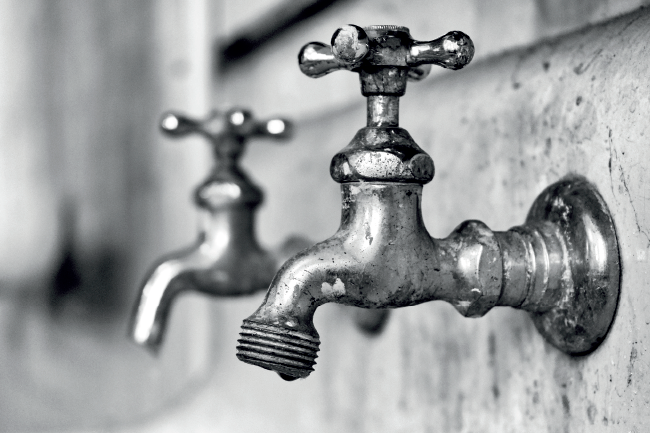South Africa is a water-stressed country, receiving an average annual rainfall of 492 mm, while the rest of the Earth receives 985 mm. In addition, the WWF cautions that 98% of South Africa’s water has already been allocated to users, leaving little surplus water to cater for a growing population and demand.
With this in mind, prepaid water – as with prepaid electricity – is a good solution to more sustainable consumption and management of shared resources.
Smart water
Smart water has many of the answers for South Africa, the world’s 30th-driest country and one that spends ZAR7 billion a year because of water losses.
Marcus Thulsidas, business development director of Utility Systems, a Sebata Water Technologies company, says the focus needs to move from crisis management to the implementation of proactive water-saving technologies – because water shortages promise to be an ongoing issue.
In addition, infrastructure, reticulation and bulk meters have not been well maintained over the past 25 years, with many leaks resulting in a huge amount of water being wasted.
In this context, one should consider a smart water-supply system fitted with sensors to measure water pressure, chemical composition and flow. When undesirable changes occur, authorities can take immediate action.
Technology has the potential to win the fight to reduce water consumption. Smart meters can detect leaks and tampering, and monitor water in almost real time (while it can take a consumer four months to detect leaks). With this control, consumers can manage their own consumption and prevent waste.

Prepaid water means that the consumer purchases water credit in the form of a prepaid water token. When entered into the user interface unit (located in the consumer’s home), the token instructs the water management device to allow a certain amount of water through the meter before closing. Consumers can track usage, load credit remotely and decrease the possibility of bill shock due to leakages or incorrect monitoring.
According to Leon Vermaak, MD of UMS, also a Sebata Water Technologies company: ‘Municipalities find themselves in a compromised position, because they can’t know with accuracy how much water is going where. Balancing is inaccurate and revenue is lost without explanation. Failure to implement appropriate metering and billing systems contributes to a worsening crisis.’
What’s possible?
There are solutions to the water crisis. As a start, municipalities need to be able to collect revenue efficiently, to enhance profitability and deliver services. Forward-thinking municipalities are already implementing smart metering, which drastically reduces government’s administration costs. This is because they don’t need to chase bad debts or budget for legal fees on unpaid accounts. Public-sector cash flow is immediately improved when municipalities are paid upfront for water.
A prepaid water meter can be used to limit water flowing to a particular area. This helps authorities and property owners control the amount of water used at certain outputs and prevents wastage in low-income households that can’t afford to pay for excess use of this basic need. They can make payments in smaller, frequent increments. This prevents their falling into debt, which can compound in a post-paid arrangement.
Collecting data from prepaid meters is more efficient than the manual collection required for post-paid meters. A radio link receiver can be fixed, vehicle-mounted or carried by municipality personnel. Data is transmitted to the receiver as soon as it’s within signal of the meter, so meter readers don’t need to enter the property. They can walk or drive by a prepaid meter to read it.
Prepaid systems are cost-effective solutions to sustainable water management in that they are not expensive and, by curbing water usage, capital recovery is possible within months. The systems are also able to distribute water equally, based on free water quotas, water balancing and fluctuating demand. Yet because of the diversity of South Africa’s socio-economic and natural environment, warns Vermaak, we must not think there is a single solution to all consumers’ needs.
Diverse solutions
Utility Systems, Amanzi Meters, UMS and Sebata Municipal Solutions are proud subsidiaries of Sebata Water Technologies, Software Solutions and Consultancy Services, which is part of the Sebata Holdings family.
Utility Systems
Smart water management
Utility Systems’ smart water-management devices (WMDs) connect to most pulse-output water meters to convert analogue units into smart devices. They offer flow limitation, prepaid water metering and bulk water management.
Automated meter reading
This technology enables the automatic collection of data – including basic diagnostic, consumption and status information – from a smart water meter and dispatched to the water authority, to facilitate accurate billing and water balancing across zones.
Advanced metering infrastructure
Bi-directional communication from the smart WMD to the utility, in near real-time, assists with early leak detection, minimises wastage, facilitates accurate billing and allows human resources to be assigned to operational or management tasks.

Amanzi Meters
Water meters
The designers of these state-of-the-art, locally produced water meters have combined a high-precision measuring insert with a high-quality, robust meter body.
Ball valves
These manually operated quarter-turn valves are used for isolating (on/off), not for regulating, via a flow-controlling spherical ball located in the valve body.
Meter boxes
These offer multiple solutions for housing and weather-proofing metering systems.
UMS
Meter audit
The firm conducts physical inspections and assessments of water meters and installations to establish functional condition for serviceability.
Spacial data management and verification
Its geo-spatial and workflow-management solutions are able to verify stand data, services and consumer information.
Meter reading and exception management
UMS carries out the physical reading of all electricity and water meters monthly and compiles exception reports based on field data recordings.
Water-flow restriction devices
These custom-designed devices restrict water flow for all water-dispensing units, as a mechanism for credit control and flow limitation for indigent households.
Sebata Municipal Solutions
Data cleansing
Using a third-party service provider, Sebata Municipal Solutions verifies and completes missing data and metadata from the municipality’s billing database.
Debtors book analysis
Clean data from the data-cleansing team is fed into financial systems (FMS and EMS), to allow municipalities to carry out live reporting and billing.


